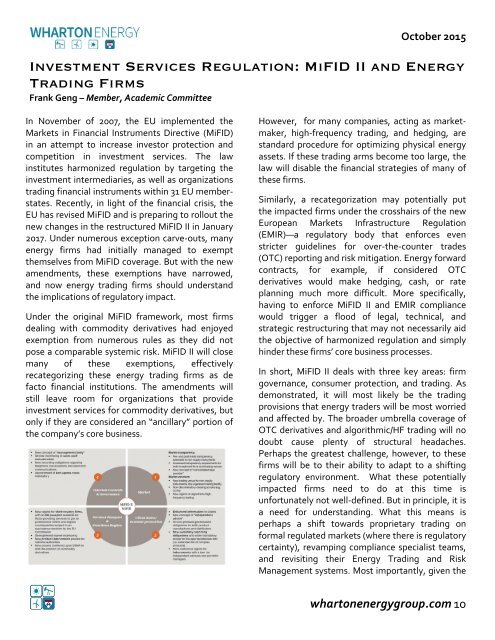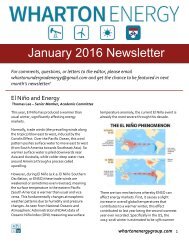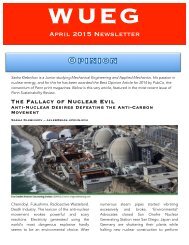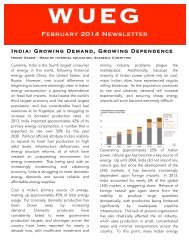Create successful ePaper yourself
Turn your PDF publications into a flip-book with our unique Google optimized e-Paper software.
<strong>October</strong> <strong>2015</strong><br />
Investment Services Regulation: MiFID II and Energy<br />
Trading Firms<br />
Frank Geng – Member, Academic Committee<br />
In November of 2007, the EU implemented the<br />
Markets in Financial Instruments Directive (MiFID)<br />
in an attempt to increase investor protection and<br />
competition in investment services. The law<br />
institutes harmonized regulation by targeting the<br />
investment intermediaries, as well as organizations<br />
trading financial instruments within 31 EU memberstates.<br />
Recently, in light of the financial crisis, the<br />
EU has revised MiFID and is preparing to rollout the<br />
new changes in the restructured MiFID II in January<br />
2017. Under numerous exception carve-outs, many<br />
energy firms had initially managed to exempt<br />
themselves from MiFID coverage. But with the new<br />
amendments, these exemptions have narrowed,<br />
and now energy trading firms should understand<br />
the implications of regulatory impact.<br />
Under the original MiFID framework, most firms<br />
dealing with commodity derivatives had enjoyed<br />
exemption from numerous rules as they did not<br />
pose a comparable systemic risk. MiFID II will close<br />
many of these exemptions, effectively<br />
recategorizing these energy trading firms as de<br />
facto financial institutions. The amendments will<br />
still leave room for organizations that provide<br />
investment services for commodity derivatives, but<br />
only if they are considered an “ancillary” portion of<br />
the company’s core business.<br />
However, for many companies, acting as marketmaker,<br />
high-frequency trading, and hedging, are<br />
standard procedure for optimizing physical energy<br />
assets. If these trading arms become too large, the<br />
law will disable the financial strategies of many of<br />
these firms.<br />
Similarly, a recategorization may potentially put<br />
the impacted firms under the crosshairs of the new<br />
European Markets Infrastructure Regulation<br />
(EMIR)—a regulatory body that enforces even<br />
stricter guidelines for over-the-counter trades<br />
(OTC) reporting and risk mitigation. Energy forward<br />
contracts, for example, if considered OTC<br />
derivatives would make hedging, cash, or rate<br />
planning much more difficult. More specifically,<br />
having to enforce MiFID II and EMIR compliance<br />
would trigger a flood of legal, technical, and<br />
strategic restructuring that may not necessarily aid<br />
the objective of harmonized regulation and simply<br />
hinder these firms’ core business processes.<br />
In short, MiFID II deals with three key areas: firm<br />
governance, consumer protection, and trading. As<br />
demonstrated, it will most likely be the trading<br />
provisions that energy traders will be most worried<br />
and affected by. The broader umbrella coverage of<br />
OTC derivatives and algorithmic/HF trading will no<br />
doubt cause plenty of structural headaches.<br />
Perhaps the greatest challenge, however, to these<br />
firms will be to their ability to adapt to a shifting<br />
regulatory environment. What these potentially<br />
impacted firms need to do at this time is<br />
unfortunately not well-defined. But in principle, it is<br />
a need for understanding. What this means is<br />
perhaps a shift towards proprietary trading on<br />
formal regulated markets (where there is regulatory<br />
certainty), revamping compliance specialist teams,<br />
and revisiting their Energy Trading and Risk<br />
Management systems. Most importantly, given the<br />
whartonenergygroup.com 10









